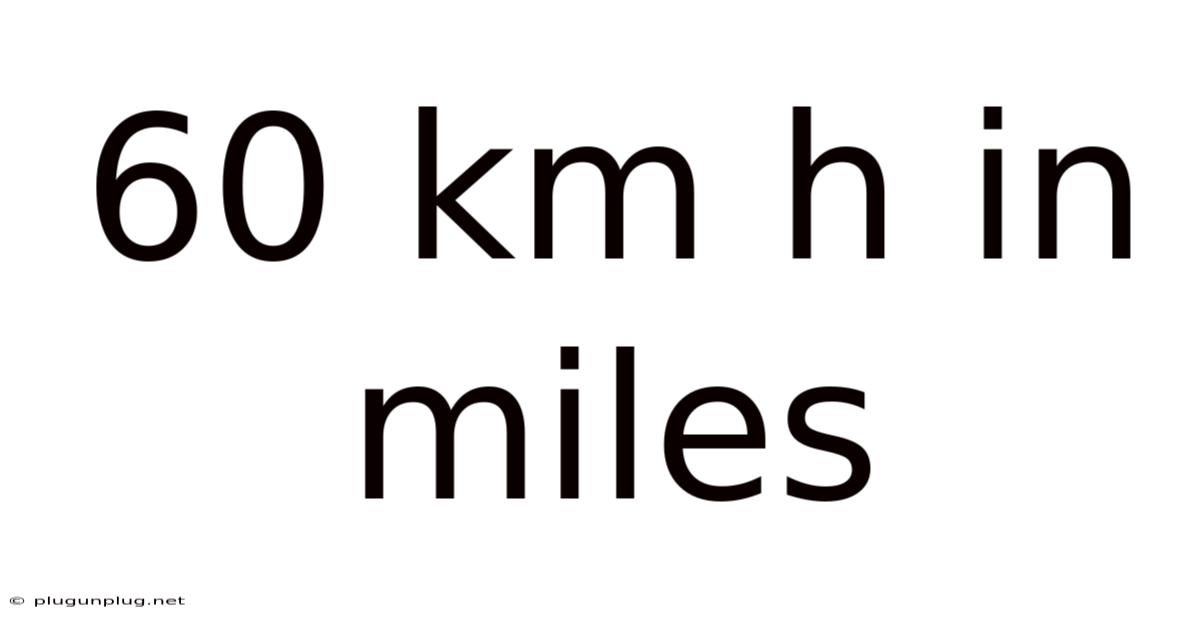60 Km H In Miles
plugunplug
Sep 23, 2025 · 4 min read

Table of Contents
Converting 60 km/h to Miles: A Comprehensive Guide
Converting speeds from kilometers per hour (km/h) to miles per hour (mph) is a common conversion needed for various purposes, from understanding speed limits in different countries to comparing the performance of vehicles. This article will delve deep into converting 60 km/h to mph, explaining the process, providing the accurate conversion, and exploring the underlying principles of unit conversion. We'll also cover frequently asked questions and provide helpful context for understanding speed and distance conversions.
Understanding the Conversion Factor
The core of converting 60 km/h to mph lies in understanding the relationship between kilometers and miles. One kilometer is approximately equal to 0.621371 miles. This conversion factor is crucial for all km/h to mph conversions. It’s the bridge that allows us to translate measurements from one unit system (metric) to another (imperial).
Calculating 60 km/h in mph: The Step-by-Step Process
To convert 60 km/h to mph, we simply multiply the speed in km/h by the conversion factor:
-
Start with the speed in km/h: 60 km/h
-
Multiply by the conversion factor: 60 km/h * 0.621371 miles/km
-
The kilometers cancel out, leaving miles per hour: 37.28226 miles/hour
Therefore, 60 km/h is approximately equal to 37.28 mph.
Rounding and Precision
The result, 37.28226 mph, is highly precise. However, for most practical purposes, rounding to a reasonable number of significant figures is sufficient. Rounding to two decimal places gives us 37.28 mph. Rounding to the nearest whole number provides 37 mph. The level of precision needed depends on the context. For everyday use, 37 mph is perfectly adequate. For scientific calculations or navigation systems, greater precision might be necessary.
Beyond the Calculation: Understanding Speed and Distance
Converting units isn't just about plugging numbers into a formula. It's about understanding the concepts of speed and distance. Speed is a measure of how quickly an object is moving, typically expressed as distance traveled per unit of time (e.g., kilometers per hour, miles per hour, meters per second). Distance is the length of the path traveled.
Understanding the relationship between speed, distance, and time is crucial. The formula connecting them is:
Speed = Distance / Time
This means that if you know two of these variables, you can calculate the third. For instance, if a car travels 120 kilometers in 2 hours, its speed is 120 km / 2 hours = 60 km/h.
Practical Applications of the Conversion
The ability to convert between km/h and mph is useful in a multitude of situations:
-
International Travel: Understanding speed limits and vehicle speeds in different countries is vital for safe driving. Many countries use the metric system (km/h), while others use the imperial system (mph).
-
Comparing Vehicle Performance: When comparing the specifications of cars or other vehicles, you may need to convert speeds to ensure accurate comparisons.
-
Mapping and Navigation: GPS systems often provide speeds in either km/h or mph, depending on the region and settings. Being able to convert allows for better understanding of the displayed information.
-
Sports and Athletics: In many sports, such as motor racing and cycling, speeds are often reported in both km/h and mph.
-
Aviation: Aviation uses both metric and imperial units. Converting speeds is crucial for clear communication and accurate calculations.
Different Conversion Methods
While multiplying by the conversion factor is the most straightforward method, other methods exist. These often involve using online converters or calculators. These tools can be useful, particularly for multiple or complex conversions, but it's important to understand the underlying principles to ensure you're using them correctly and interpreting the results accurately.
Frequently Asked Questions (FAQs)
Q1: Is the conversion factor always 0.621371?
A1: Yes, this is the commonly used and accepted conversion factor for converting kilometers to miles. There might be slight variations depending on the level of precision required, but 0.621371 is accurate enough for most applications.
Q2: How do I convert mph back to km/h?
A2: To convert mph back to km/h, you use the inverse of the conversion factor. The inverse of 0.621371 is approximately 1.60934. So, you multiply the speed in mph by 1.60934 to get the speed in km/h.
Q3: What if I need to convert a different speed, say 80 km/h?
A3: The process is the same. Simply multiply 80 km/h by 0.621371 miles/km to get the speed in mph (approximately 49.71 mph).
Q4: Are there any online tools to help with this conversion?
A4: Yes, numerous online converters are available that can perform this and other unit conversions quickly and easily.
Conclusion
Converting 60 km/h to mph is a straightforward process involving multiplication by the conversion factor 0.621371. The result, approximately 37.28 mph, is relevant in various contexts, from international travel to comparing vehicle performance. Understanding the underlying principles of unit conversion, including the relationship between speed, distance, and time, empowers you to navigate different unit systems with confidence. Remember to choose the level of precision appropriate for your specific needs and always double-check your calculations. This understanding transcends simple conversion; it helps cultivate a more profound appreciation of measurement and its application in the real world.
Latest Posts
Related Post
Thank you for visiting our website which covers about 60 Km H In Miles . We hope the information provided has been useful to you. Feel free to contact us if you have any questions or need further assistance. See you next time and don't miss to bookmark.